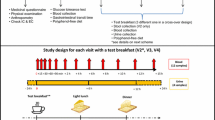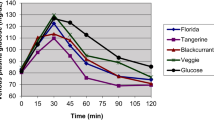Abstract
Background
Strong epidemiological evidence suggests that coffee consumption is associated with lower risk of type 2 diabetes. In postprandial studies, however, caffeine consumption has been associated with impaired glucose regulation.
Aim of the study
To study the acute effects of coffee and caffeine-containing soft drinks on glycaemic and insulinaemic responses.
Design
Twelve healthy volunteers were served each test food once and the reference glucose solution twice, containing 50 g of available carbohydrates, after an overnight fast at 1-week intervals in a random order. Capillary blood samples were drawn at 15–30 min intervals for 2 h after each study meal. The incremental areas under the curve (IAUC), glycaemic index (GI) and insulinaemic index (II), were calculated to estimate the glycaemic and insulinaemic responses.
Results
Glucose and insulin responses of coffees with glucose containing 150 or 300 mg of caffeine did not differ from responses of pure glucose solution; the GIs were 104 and 103, and the IIs were 89 and 92, respectively. When a bun or sucrose and milk were consumed together with coffee, lower GI values and insulin responses were observed, reflecting the carbohydrate quality and protein content of the accompaniments. Sucrose-sweetened cola produced a high GI value of 90 and an II of 61.
Conclusions
Coffee does not modify glycaemic and insulinaemic responses when ingested with a carbohydrate source. Therefore, there is no need to avoid coffee as a choice of beverage in GI testing.

Similar content being viewed by others
References
Huxley R, Lee CM, Barzi F, Timmermeister L, Czernichow S, Perkovic V, Grobbee DE, Batty D, Woodward M (2009) Coffee, decaffeinated coffee, and tea consumption in relation to incident type 2 diabetes mellitus: a systematic review with meta-analysis. Arch Intern Med 169:2053–2063
Van Dam RM, Hu FB (2005) Coffee consumption and risk of type 2 diabetes: a systematic review. JAMA 294:97–104
Battram DS, Arthur R, Weekes A, Graham TE (2006) The glucose intolerance induced by caffeinated coffee ingestion is less pronounced than that due to alkaloid caffeine in men. J Nutr 136:1276–1280
Graham TE, Sathasivam P, Rowland M, Marko N, Greer F, Battram D (2001) Caffeine ingestion elevates plasma insulin response in humans during an oral glucose tolerance test. Can J Physiol Pharmacol 79:559–565
Greer F, Hudson R, Ross R, Graham T (2001) Caffeine ingestion decreases glucose disposal during a hyperinsulinemic-euglycemic clamp in sedentary humans. Diabetes 50:2349–2354
Keijzers GB, De Galan BE, Tack CJ, Smits P (2002) Caffeine can decrease insulin sensitivity in humans. Diabetes Care 25:364–369
Lane JD, Barkauskas CE, Surwit RS, Feinglos MN (2004) Caffeine impairs glucose metabolism in type 2 diabetes. Diabetes Care 27:2047–2048
Petrie HJ, Chown SE, Belfie LM, Duncan AM, McLaren DH, Conquer JA, Graham TE (2004) Caffeine ingestion increases the insulin response to an oral-glucose-tolerance test in obese men before and after weight loss. Am J Clin Nutr 80:22–28
Thong FS, Graham TE (2002) Caffeine-induced impairment of glucose tolerance is abolished by beta-adrenergic receptor blockade in humans. J Appl Physiol 92:2347–2352
Johnston KL, Clifford MN, Morgan LM (2003) Coffee acutely modifies gastrointestinal hormone secretion and glucose tolerance in humans: glycemic effects of chlorogenic acid and caffeine. Am J Clin Nutr 78:728–733
Pizziol A, Tikhonoff V, Paleari CD, Russo E, Mazza A, Ginocchio G, Onesto C, Pavan L, Casiglia E, Pessina AC (1998) Effects of caffeine on glucose tolerance: a placebo-controlled study. Eur J Clin Nutr 52:846–849
Aldughpassi A, Wolever TMS (2009) Effect of coffee and tea on the glycaemic index of foods: no effect on mean but reduced variability. Br J Nutr 101:1282–1285
Moisey LL, Kacker S, Bickerton AC, Robinson LE, Graham TE (2008) Caffeinated coffee consumption impairs blood glucose homeostasis in response to high and low glycemic index meals in healthy men. Am J Clin Nutr 87:1254–1261
Lane JD, Hwang AL, Feinglos MN, Surwit RS (2007) Exaggeration of postprandial hyperglycemia in patients with type 2 diabetes by administration of caffeine in coffee. Endocr Pract 13:239–243
Malik VS, Popkin BM, Bray GA, Despres JP, Willett WC, Hu FB (2010) Sugar sweetened beverages and risk of metabolic syndrome and type 2 diabetes: a meta-analysis. Diabetes Care 33:2477–2483
Schulze MB, Manson JE, Ludwig DS, Colditz GA, Stampfer MJ, Willett WC, Hu FB (2004) Sugar-sweetened beverages, weight gain, and incidence of type 2 diabetes in young and middle-aged women. JAMA 292:927–934
Akgun S, Ertel NH (1985) The effects of sucrose, fructose, and high-fructose corn syrup meals on plasma glucose and insulin in non-insulin-dependent diabetic subjects. Diabetes Care 8:279–283
Janssens JP, Shapira N, Debeuf P, Michiels L, Putman R, Bruckers L, Renard D, Molenberghs G (1999) Effects of soft drink and table beer consumption on insulin response in normal teenagers and carbohydrate drink in youngsters. Eur J Cancer Prev 8:289–295
Atkinson FS, Foster-Powell K, Brand-Miller JC (2008) International tables of glycemic index and glycemic load values: 2008. Diabetes Care 31:2281–2283
WHO (1999) Definition, diagnosis and classification of diabetes mellitus and its complications: report of a WHO consultation. Part 1, diagnosis and classification of diabetes mellitus Geneva. World Health Organization, Geneva
Åman P, Hesselman K (1984) Analysis of starch and other main constituents of cereal-grains. Swedish J Agric Res 14:135–139
Oikarinen SI, Erlund I, Mutanen M (2007) Tumor formation in multiple intestinal neoplasia (Apc Min/+) mice fed with filtered or unfiltered coffee. Scand J Food Nutr 51:167–173
International Standard (2010) ISO 26642. Food products—determination of the glycaemic index (GI) and recommendation for food classification, Switzerland. ISO 26642:2010(E)
Robinson LE, Savani S, Battram DS, McLaren DH, Sathasivam P, Graham TE (2004) Caffeine ingestion before an oral glucose tolerance test impairs blood glucose management in men with type 2 diabetes. J Nutr 134:2528–2533
Vergauwen L, Hespel P, Richter EA (1994) Adenosine receptors mediate synergistic stimulation of glucose uptake and transport by insulin and by contractions in rat skeletal muscle. J Clin Invest 93:974–981
Smits P, Boekema P, De Abreu R, Thien T, van ‘t Laar A (1987) Evidence for an antagonism between caffeine and adenosine in the human cardiovascular system. J Cardiovasc Pharmacol 10:136–143
van Dijk AE, Olthof MR, Meeuse JC, Seebus E, Heine RJ, van Dam RM (2009) Acute effects of decaffeinated coffee and the major coffee components chlorogenic acid and trigonelline on glucose tolerance. Diabetes Care 32:1023–1025
Östman EM, Liljeberg Elmstahl HG, Björck IM (2001) Inconsistency between glycemic and insulinemic responses to regular and fermented milk products. Am J Clin Nutr 74:96–100
Lee BM, Wolever TM (1998) Effect of glucose, sucrose and fructose on plasma glucose and insulin responses in normal humans: comparison with white bread. Eur J Clin Nutr 52:924–928
Acknowledgments
We warmly thank the volunteers for taking the time to participate in postprandial study. We thank Heikki Pakkala and Jukka Lauronen for assisting with the technical aspects of the study; Laura Lund, Taina Öhman, Elina Rintala, Irja Kanniainen and Lea Paul for laboratory assistance. This study was supported by Academy of Finland (grant no. 111420), the Juho Vainio Foundation, the Finnish Cultural Foundation and the Finnish Graduate School on Applied Bioscience: Bioengineering, Food and Nutrition, Environment.
Author information
Authors and Affiliations
Corresponding author
Rights and permissions
About this article
Cite this article
Hätönen, K.A., Virtamo, J., Eriksson, J.G. et al. Coffee does not modify postprandial glycaemic and insulinaemic responses induced by carbohydrates. Eur J Nutr 51, 801–806 (2012). https://doi.org/10.1007/s00394-011-0258-4
Received:
Accepted:
Published:
Issue Date:
DOI: https://doi.org/10.1007/s00394-011-0258-4




